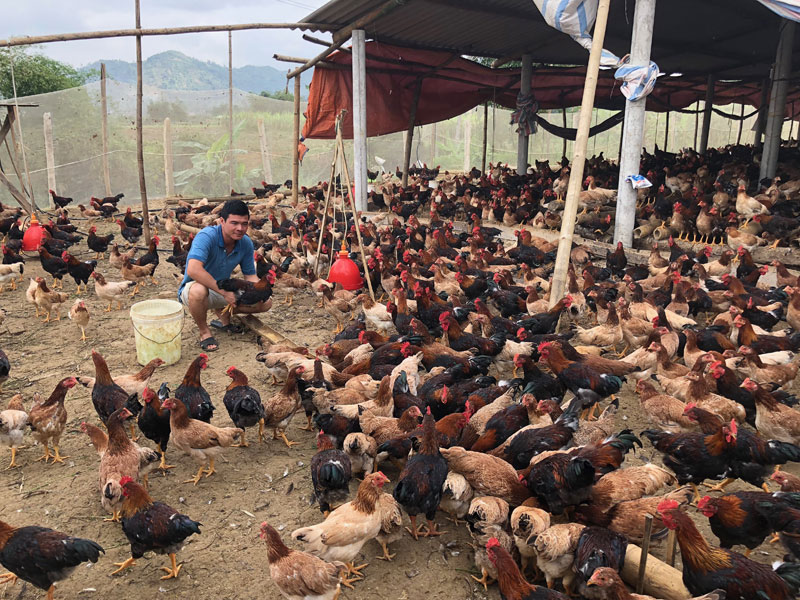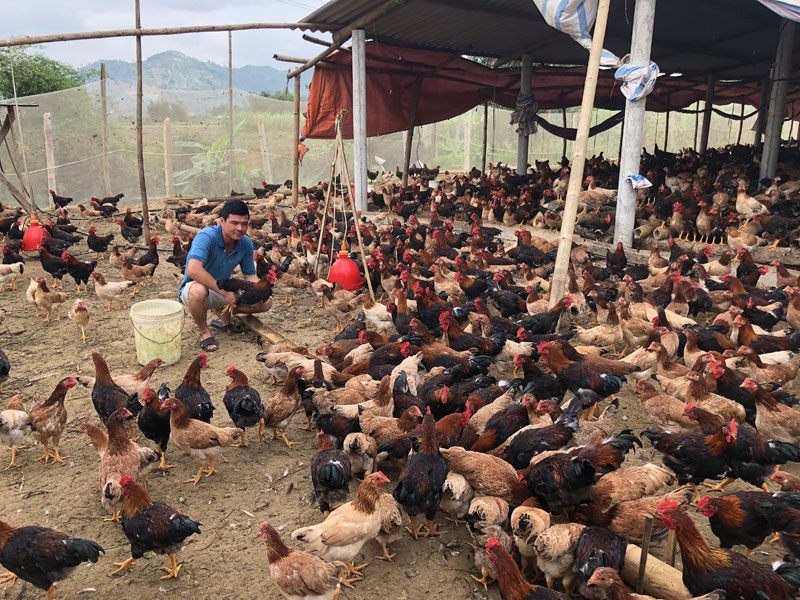
(HBO) - In 2015, some farmers in Dam hamlet, Yen Nghiep commune (Lac Son) discussed, exchanged and selected the investment in the indigenous chicken raising in the direction of trade with the purpose of economic development of the family.
In 2016, stemming from the need to regroup, they formed a hobby group, officially establishing a cooperative group to raise the indigenous chicken in Dam hamlet with 8 households. By the synergy of the members, the cooperative group has maintained and developed, becoming a reliable address for indigenous chicken supply to the market inside and outside the province.
 The chicken farm of the cooperative group in Dam hamlet, Yen Nghiep commune (Lac Son) has been combining farming with high quality products.
The chicken farm of the cooperative group in Dam hamlet, Yen Nghiep commune (Lac Son) has been combining farming with high quality products.
The person who has been devoting much to the development of the cooperative group in Dam hamlet is Mr. Bui Van Linh. He has been acting a leader. More than 30 years old, Mr. Linh has had decades attaching to farming from rice cultivation, sugarcane planting, corn cultivation, pig raising and now building the chicken farms.
At the same time in 2016, some other typical households in Dam hamlet also started to raise chicken, namely Mr. Duong Van Diem, Bui Van Em and Bui Van Vi.
The team leader is the manager, assigning daily tasks to the other members. At the same time, the members of the team promote the spirit of learning, exchanging and sharing experiences so that the production and business activities are convenient and smooth.
Combining forces to develop together, the households in the cooperative group in Dam hamlet not only help each other in terms of techniques but also in the stage of breeding, capital, experience and linking consumer markets.
With the business season focused mainly in April and September and during the lunar New Year, the members of the group have been developing the chicken production based on the set plan. The consumption through the wholesale customers and the buyers themselves account for about 90%, the remaining 10% is sold to the retail customers or the weddings. There have been 15 chicken farms in the whole cooperative group. Each farm maintains an average of 1,500-2,000 chicken a litter, each year 4.6 - 4.7 thousand of chicken are raised.
In order to stabilize on the way of starting a business, the members of the group want to be supported the necessary and sufficient conditions in the future to become the cooperative, applying the procedures and the standards for commercial clean chicken, ensuring food safety, having logos and identification labels to affirm the brand, improving the competitiveness and meeting the consumers’ confidence. On the other hand, the cooperative group has the access to join the chains of production and consumption to create the sustainable livestock value.
According to data from the Hoa Binh Provincial Party Committee, the industrial production index for the first six months of 2025 is estimated to have increased by 20% compared to the same period last year. This marks the highest year-on-year growth rate for this period since 2020.
In the first six months of 2025, Hoa Binh province’s export turnover was estimated at 1.145 billion USD, marking an 18.11% increase compared to the same period in 2024. Import turnover was estimated at $ 804 million, a 17.15% increase, which helped the province maintain a positive trade balance.
The lives of the ethnic minority farmers in Tan Lac district have gradually improved thanks to the new directions in agricultural production. This is a testament to the collective strength fostered through the professional associations and groups implemented by various levels of the district’s Farmers’ Union.
With the motto the "product quality comes first,” after nearly one year of establishment and operation, Muong village’s Clean Food Agricultural and Commercial Cooperative, located in Cau Hamlet, Hung Son Commune (Kim Boi district), has launched reputable, high-quality agricultural products to the market that are well-received by consumers. The products such as Muong village’s pork sausage, salt-cured chicken, and salt-cured pork hocks have gradually carved out a place in the market and they are on the path to obtaining the OCOP certification.
In the past, the phrase "bumper harvest, rock-bottom prices" was a familiar refrain for Vietnamese farmers engaged in fragmented, small-scale agriculture. But today, a new spirit is emerging across rural areas of Hoa Binh province - one of collaboration, organisation, and collective economic models that provide a stable foundation for production.
Maintaining growing area codes and packing facility codes in accordance with regulations is a mandatory requirement for agricultural products to be eligible for export. Recently, the Department of Agriculture and Environment of Hoa Binh province has intensified technical supervision of designated farming areas and packing facilities to safeguard the "green passport" that enables its products to access international markets.



 The chicken farm of the cooperative group in Dam hamlet, Yen Nghiep commune (Lac Son) has been combining farming with high quality products.
The chicken farm of the cooperative group in Dam hamlet, Yen Nghiep commune (Lac Son) has been combining farming with high quality products.